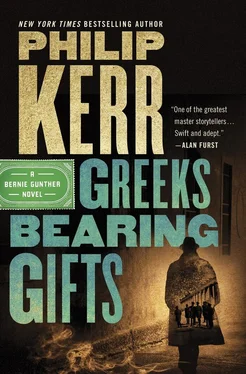“I know that’s an emotive word, ‘atonement.’ In Judaism this means the process of causing a transgression against God to be forgiven or pardoned. So perhaps it’s blasphemous of me to take it upon myself to offer you that chance, Christof. But that’s exactly what I’m doing. A chance to do something good with what’s left of your life. Israelis and Jews — there are plenty of them I can get to work for the Institute. None with the experience I need. What I really need are a few Germans who aren’t Jews. Germans with a conscience. Germans like you who are in respectable jobs, and who have some background in intelligence. That’s you, isn’t it? You’re not quite as innocent about these things as you like to pretend.”
I nodded. “It’s a long time since I felt innocent about anything.”
“Then take it from one who knows all about collective guilt. I’m a Jew. We’ve been paying for the death of Jesus Christ for two thousand years. Well, I certainly don’t believe we could or should even try to atone for that particular fairy story. But I do believe that an individual can help to atone for something that happened not much more than a decade ago. An individual like you, perhaps. Someone who could help to influence the future of his own country and the new moral order for the better.”
“Those are grand words for a small man like me.”
“Make them yours, Christof.”
“You really think Max Merten will walk free?”
“Not today. But before the end of the year, yes, I’m more or less certain of it.”
I thought for a moment. It’s not unusual for intelligent people to end up working in intelligence; some of them are very intelligent indeed; but I was struck by the bandit queen’s great perception — by the way she seemed to see straight through the hard carapace to the part of me that was a man with a vestigial conscience. It was almost as if somehow this Israeli spy chief had, like some Hebrew prophet, managed to spy into the very depths of my soul. I answered her carefully before shaking her hand again.
“I’m not sure how I can help you get Hans Globke. But I think I can help you get someone else.”
I caught a taxiup the Acropolis, to see the Parthenon up close and touch it as I might have touched a valuable holy icon. After all the tea towel prints and plaster model copies of the temple I’d seen I hadn’t expected the real thing to be as impressive as it turned out to be. Had it been as refined a piece of architecture to those poor ghosts the ancient Athenians as it was to us living mortals now? I couldn’t see how not — how it wouldn’t always have been viewed as one of the premier works of man and no less of an achievement now because it was substantially ruined, perhaps more of an achievement, for did this not remind every man of his own temporal fragility? There’s nothing like a Greek ruin to make you feel like reading one of those old books by Plato or Aristotle.
Built as the temple of Athena, it became a Christian church in the fifth century AD and, for a while, in spite of its amorphous, pagan origins, it was even an important destination for Christian pilgrims. I wondered if they’d really cared all that much what God was called. Or what the hymns were, silent now, once sung by those high priestesses of Athena. Surely what mattered to them more was this perfect celebration of the immortals. It was certainly what mattered to me. I was hearing voices all right.
Following the Ottoman conquest, this anonymous stone glory was a mosque for more than two hundred years, until 1687, when it was heavily fortified and turned into a gunpowder magazine with the result that the Venetians turned up and bombarded it with cannon, and the Parthenon was partly destroyed, perhaps the first sign of where science would one day lead us. But somehow it had survived all that. And since 1832 the Doric ruins had been the most important cultural site in Greece, which was why I was there now, I supposed, with an hour to kill before Garlopis took me to the airport, and feeling unexpectedly moved, like one of those Christian pilgrims, perhaps. There were plenty of tourists around, most of them Americans and Japanese from the real world of salaried salesmen and menu-making housewives, but I expect I was one of the few who were there who saw the front façade of the Parthenon and felt homesick for my real home, which was in Berlin. With neoclassical buildings such as the Brandenburg Gate, the New Guardhouse memorial, and the National Gallery, Berlin had more Greek revivals than the cult of Dionysus and knew more than one thing about destruction, too. By the time the Red Army had finished its own brutal pagan handiwork, the old island of Berlin and its Parthenon copies looked much more like the original than anyone except Stalin would ever have wished.
Walking quietly around and through this petrified forest of columns and the epic affirmation of what man was capable of, I could also reflect on perhaps the other major lesson of the place, which, at least for me, was that anything and everything could change, even something as great as the Parthenon.
And if that, then why not Bernie Gunther?
It seemed that when things from the past looked to every cynical eye as if they’d been irreparably destroyed they might yet have a future. A different future but, perhaps, a no less important one. Like Gunther, parts of the Parthenon still looked hopelessly beyond repair; the causeway leading up to the façade was a builder’s yard of fallen pediments, damaged metopes, and broken columns; perhaps the Parthenon would take as long to preserve and repair as it had ever taken to build. Longer, perhaps, since preservation always moves at a slower, more reverent pace than construction. But I decided you could either complain about the cultural vandalism of the Turks and the Venetians, hope that someone else better qualified would one day get around to fixing the place up a bit or, perhaps, you could find a crane, pick up some of the marble stones, and erect some scaffolding yourself.
My own hymns to love were probably forever silent now, but what of it? I was too old for all that malarkey anyway. Elli couldn’t have known it but in a way she’d spared me. Probably we’d spared each other.
And to mark where I had been and to testify to what I still had in me to accomplish, I needed only that place in the new moral order offered by the bandit queen, where a drifting ghost like me could feel like something real again and breathe the dream of true atonement.
DR. MAX MERTENwas arrested in an Athens court during Arthur Meissner’s trial for war crimes and property pillage in the spring of 1943. Queen Frederica of Greece (herself a German) questioned Merten’s prosecution, asking if “this is the way Mr. District Attorney understands the development of German and Greek relations.” When he was held in Averoff Prison on remand, the West German government strenuously protested his arrest. Two years later, on February 11, 1959, Merten went to trial accused of murder, property pillage, gold coins expropriation, and other war crimes against Jews. The president of the court, one Colonel Kokoretsas, excluded the attorneys for the Jewish community of Salonika from presenting evidence in court; only individual Jewish plaintiffs were allowed to testify, thus diminishing the true scale of the crime against Greece’s Jews. Merten pleaded not guilty to all of the charges and his defense was paid for by the federal government of Germany. On March 5, 1959, Max Merten was convicted of war crimes and sentenced to twenty-five years in prison. After serving just eight months Merten was freed by Prime Minister Konstantinos Karamanlis in a general amnesty on November 5, 1959. In March 1960, an “economic agreement” was signed between Greece and Germany stipulating the sum of just 115 million marks (about $26 million) to be paid as reparations. A laughable amount of money, given all that Greece had suffered. Germany also agreed to provide separate sums as “loans” to Greece. Max Merten returned to Germany, where he received substantial damages for the period he’d spent in jail. He provided written evidence during the Eichmann trial in 1960 although he did not attend, and he died in 1971 or 1976. He never returned to Greece.
Читать дальше











